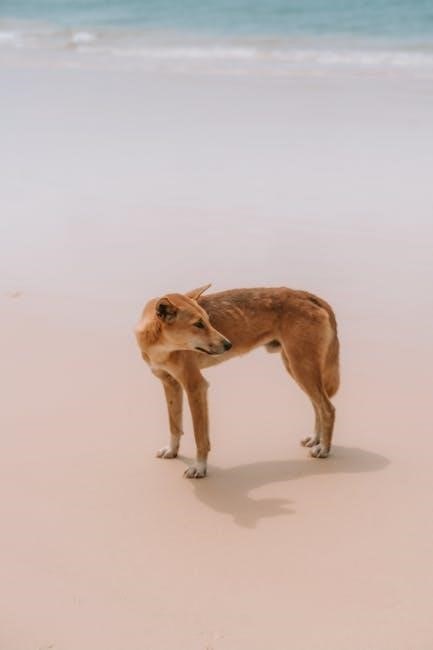
Explore the world of sea duck hunting guides—experts who provide essential strategies, safety, and local knowledge for a successful and ethical hunting experience in challenging marine environments․
What is Sea Duck Hunting?
Sea duck hunting is a specialized form of waterfowl hunting that targets species of ducks adapted to marine environments․ It often involves pursuing robust, hearty birds like eiders, scoters, and long-tailed ducks in coastal areas, including bays, estuaries, and open seas․ This type of hunting is known for its challenges, as sea ducks are difficult to approach and require precise strategies․ Hunters typically use decoys, calls, and concealment to attract these birds, which are highly vigilant and accustomed to harsh conditions․ Sea duck hunting demands a deep understanding of tidal movements, weather patterns, and local habitats․ It is a rewarding yet demanding pursuit, often requiring specialized gear and expertise, making it a niche activity within the broader world of waterfowl hunting;
The Appeal of Sea Duck Hunting
Sea duck hunting captivates enthusiasts with its unique blend of adventure, challenge, and connection to nature․ The pursuit of robust, marine-adapted species like eiders, scoters, and long-tailed ducks offers a thrilling experience in rugged coastal environments․ Hunters are drawn to the test of skill required to outsmart these wary birds, which often inhabit remote and breathtaking locations․ The camaraderie among hunters, combined with the satisfaction of harvesting wild game, adds to the allure․ For many, it’s not just about the hunt but also about immersing oneself in the beauty of marine ecosystems and the thrill of overcoming the elements․ This niche pursuit fosters a deep appreciation for wildlife conservation and the importance of ethical hunting practices, making it a rewarding and memorable experience for those who brave the challenge․
Key Considerations for Beginners
For newcomers to sea duck hunting, understanding local regulations, obtaining necessary licenses, and familiarizing oneself with species-specific rules are crucial․ Beginners should invest in high-quality, durable gear designed for marine environments, including decoys, firearms, and appropriate clothing․ Safety is paramount, as hunting in rough waters demands preparedness for unpredictable conditions․ Learning to identify species accurately and respecting daily limits ensures ethical and legal hunting practices․ Additionally, hiring an experienced guide can significantly enhance success and safety, as they provide insights into optimal locations, timing, and strategies․ Beginners should also practice marksmanship, as sea ducks are challenging targets․ Starting with guided trips helps build confidence and skill, making the transition to independent hunting smoother and more enjoyable․
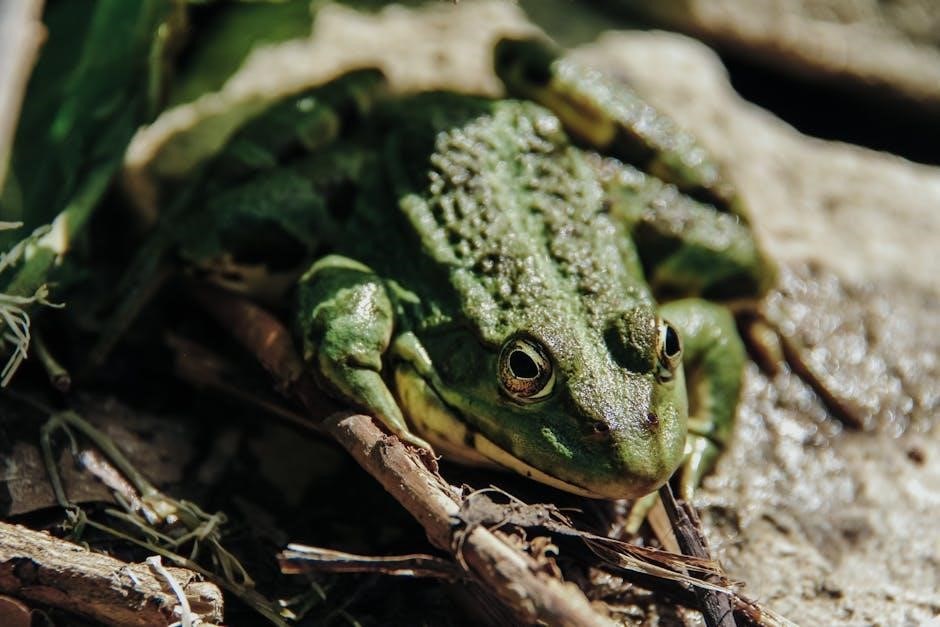
Best Locations for Sea Duck Hunting
The Bering Sea, New England, and the Great Lakes are premier destinations for sea duck hunting, offering diverse species and challenging yet rewarding experiences for hunters seeking adventure․
The Bering Sea: A Premier Destination
The Bering Sea is renowned for its abundant sea duck populations, offering hunters a chance to target species like Pacific Eiders and Long-Tailed Ducks․ Its remote location ensures pristine hunting grounds, but the harsh climate and rough seas demand experienced guides and specialized gear․ Local guides provide invaluable insights into tidal movements, bird behavior, and safe navigation․ Hunters must be prepared for extreme weather conditions, including strong winds and icy waters․ The Bering Sea’s challenging environment makes it a true test of skill and endurance, attracting seasoned hunters seeking a unique adventure․ With proper planning and expert guidance, this region delivers unforgettable experiences for those willing to brave its unforgiving yet breathtaking landscape․
New England: A Hotspot for Diverse Species
New England is a paradise for sea duck hunters, offering a diverse range of species such as Harlequin Ducks, Common Eiders, and Long-Tailed Ducks․ The region’s unique coastal layout, with its rocky shores and abundant food sources, attracts waterfowl from across North America․ Hunters are drawn to the area’s vibrant wildlife and the opportunity to pursue multiple species in a single trip․ Local guides play a crucial role in navigating the complex tides and identifying prime hunting locations․ The season typically peaks during migration, making it essential to time visits carefully․ With the right gear and expertise, New England delivers unforgettable sea duck hunting experiences, blending challenging conditions with rewarding outcomes for both novice and experienced hunters․
The Great Lakes: Prime Grounds for Waterfowl
The Great Lakes region is renowned for its exceptional waterfowl hunting opportunities, particularly for sea ducks․ The vast freshwater ecosystems attract species like Redhead Ducks, Canvasbacks, and Lesser Scaup․ These areas are crucial stopovers during migration, offering abundant food and shelter․ Hunters benefit from the region’s diverse habitats, including shallow bays and marshlands․ Local guides are invaluable, as they know the best locations and timing to maximize success․ The combination of productive hunting grounds and expert guidance makes the Great Lakes a must-visit destination for waterfowl enthusiasts seeking a rich and rewarding experience․
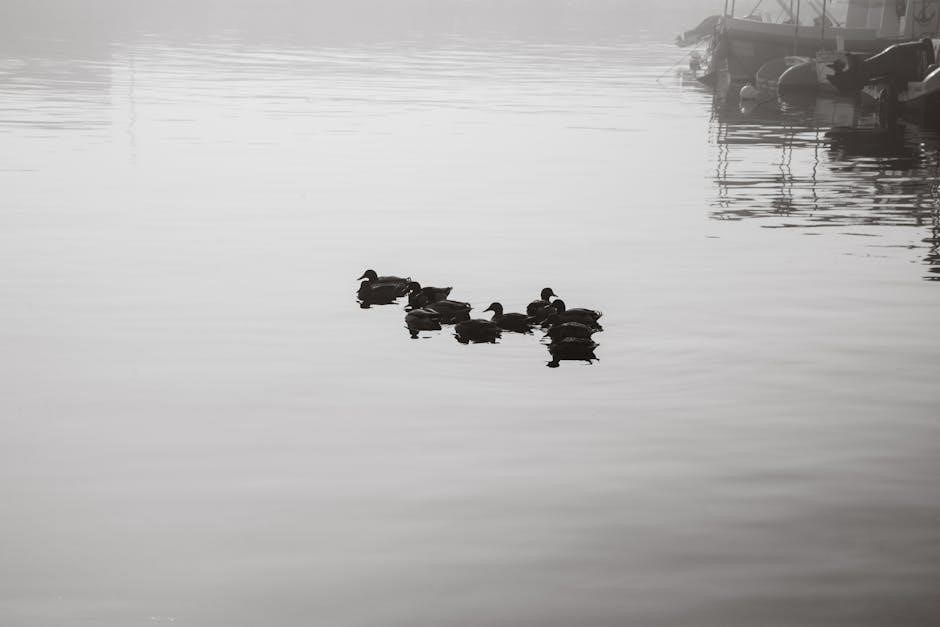
Species-Specific Hunting Strategies
Mastering species-specific tactics is crucial for success․ Pacific Eiders, Long-Tailed Ducks, and Scoters each require tailored approaches, from decoy placement to calling techniques, to match their unique behaviors and habitats․
Hunting Pacific Eiders: Challenges and Tips
Hunting Pacific Eiders is renowned for its challenges due to their robust nature and the harsh environments they inhabit, such as the Bering Sea․ These ducks are difficult to bring down in flight and nearly impossible to kill on the water, requiring precise shots and reliable firepower․ To succeed, hunters must employ effective decoy systems and calling techniques to attract these wary birds․ Understanding their behavior, such as their tendency to move in tight flocks, is key․ Using a high-caliber shotgun, like a 12-gauge, is recommended to ensure clean kills․ Additionally, hunters should study the birds’ feeding patterns and tidal movements to position themselves effectively․ Local guides can provide invaluable insights and improve safety in these dangerous waters․
Targeting Long-Tailed Ducks: Effective Methods
Long-tailed ducks, also known as oldsquaws, are highly sought-after for their unique characteristics and challenging behavior․ Known for their agility and speed, they require precise timing and accurate shooting․ Effective methods include using high-quality decoys designed to mimic their appearance and movements․ Calling techniques must be mastered, as these ducks are highly responsive to realistic sounds․ Understanding their migration patterns and habitat preferences is crucial for positioning․ Hunters should employ a 12-gauge shotgun with steel shot for optimal range and penetration․ Local guides can provide valuable insights into their behavior and prime hunting locations․ Adhering to daily limits and regulations ensures sustainable hunting practices․ Patience and adaptability are key, as long-tailed ducks often fly in tight flocks, making them both challenging and rewarding prey․
Scoters: Strategies for Success
Hunting scoters requires a combination of skill, patience, and the right equipment․ These ducks are highly wary and often fly in large flocks, making them challenging to approach․ Successful hunters emphasize the importance of using realistic decoys, particularly those mimicking scoters and other diving ducks․ Concealment is key, as scoters are easily spooked by visible movement or bright colors․ A 12-gauge shotgun with large shot sizes, such as BB or T, is recommended for their tough feathers and dense bodies․ Understanding their flight patterns and feeding habits, such as their preference for shallow coastal waters, can improve your chances․ Working with an experienced guide who knows their habitats and behaviors is often the most effective way to locate and hunt scoters successfully․
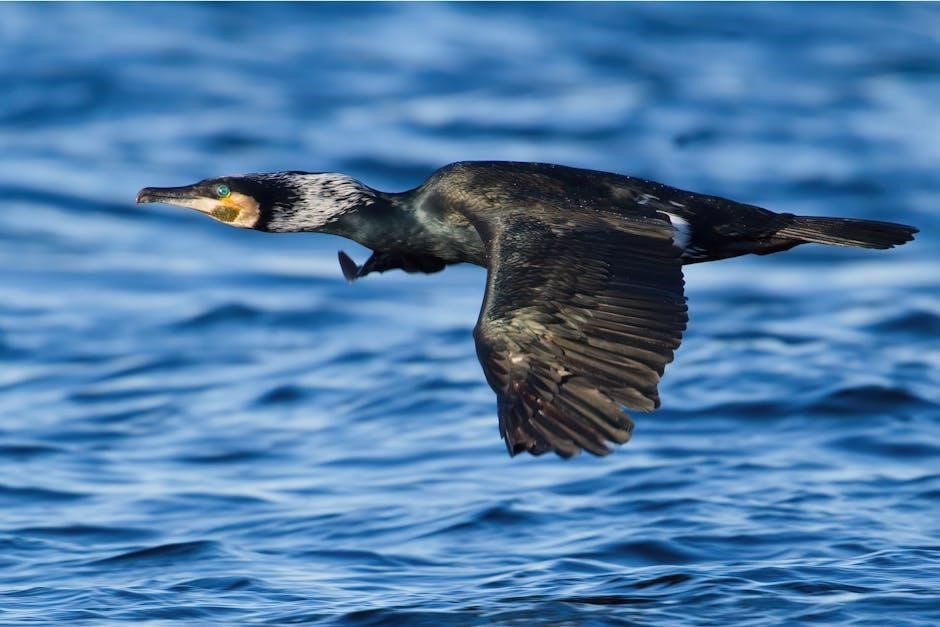
Regulations and Safety
Adhering to local regulations is crucial for legal and ethical hunting․ Ensure proper licenses, respect daily limits, and prioritize marine safety, using life jackets and weather-aware tactics․
Licenses and Permits: What You Need to Know
Obtaining the correct licenses and permits is essential for legal sea duck hunting․ Ensure you have a valid waterfowl hunting license and any required state or federal stamps․ Additionally, check for species-specific permits, as some sea ducks may require special authorization․ Always carry these documents with you during hunts․ Guides often help navigate these requirements, ensuring compliance and avoiding legal issues․ Remember, regulations vary by location, so research local laws or consult with a professional guide to stay informed and adhere to all legal standards․
Daily Limits and Bag Restrictions
Daily limits and bag restrictions are crucial for sustainable sea duck hunting․ Typically, hunters are allowed a maximum of 6 ducks per day, with specific limits on species like mallards, wood ducks, and scoters․ Ensure you understand local regulations, as they vary by region and species․ Exceeding these limits can result in legal consequences․ Bag restrictions help conserve populations and maintain ecological balance․ Always check updated regulations before your hunt and consider consulting a guide for clarity․ Adhering to these rules ensures responsible hunting practices and preserves opportunities for future generations of hunters․ Stay informed to avoid violations and contribute to the conservation of waterfowl populations․ Compliance is key to ethical and sustainable hunting․
Safety Measures in Marine Environments
Safety is paramount in sea duck hunting, as marine environments can be unpredictable and hazardous․ Always wear a properly fitting life jacket and ensure your boat is equipped with essential safety gear, such as flares, a first-aid kit, and a reliable communication device․ Check weather forecasts and tide movements before heading out, as rough seas or shifting tides can pose significant risks․ Familiarize yourself with navigation tools and ensure your boat is seaworthy․ Hunting with a partner is strongly recommended, and inform someone ashore of your itinerary․ Be prepared for emergencies, such as hypothermia or equipment failure, and know how to respond․ Safe practices ensure a successful and enjoyable hunting experience in challenging marine conditions․
Essential Gear for Sea Duck Hunting
Premium decoys, reliable firearms, sturdy boats, and weather-resistant clothing are vital for a successful sea duck hunting experience, ensuring safety and effectiveness in harsh marine conditions․
Decoy Systems: Attracting Sea Ducks Effectively
Decoy systems are crucial for luring sea ducks, requiring a mix of diver and puddle duck decoys․ Proper placement and movement mimic natural behavior, attracting wary species like scoters and eiders․ Visibility is key, as sea ducks often approach from great distances․ Using high-quality, realistic decoys ensures better results, while motion decoys add life-like appeal․ Guides emphasize the importance of decoy spreads tailored to species and conditions, ensuring a convincing setup that draws birds effectively․
Firearms and Ammunition: Choosing the Right Tools
Selecting the right firearms and ammunition is vital for successful sea duck hunting․ A 12-gauge shotgun is often recommended for its balance of power and range․ Barrels of 26–30 inches are ideal for accuracy and maneuverability․ Steel shot is preferred for its penetration and effectiveness at longer distances․ Choke tubes, such as modified or improved cylinders, are crucial for optimal shot patterns․ Ammunition choice depends on the species and conditions, with larger shot sizes for tougher birds like eiders․ Guides often emphasize the importance of non-toxic ammunition to comply with regulations; Properly matching firearms and ammo ensures ethical and efficient harvesting of sea ducks, while practice is key to accuracy in challenging marine environments․
Boats and Accessories: Navigating Rough Waters
Boats and accessories are critical for navigating the rough waters of sea duck hunting․ A sturdy, seaworthy vessel is essential, with many hunters opting for aluminum or fiberglass boats due to their durability and buoyancy․ The size of the boat should accommodate hunters, gear, and decoys comfortably, with a minimum length of 16 feet recommended․ Anchors, trolling motors, and GPS systems are vital for maintaining position in currents and locating prime hunting spots․ Storage compartments and layout designs should prioritize accessibility and efficiency․ Life jackets, flares, and emergency beacons are mandatory safety measures․ A reliable engine and communication devices ensure quick response to changing conditions․ These tools collectively enhance safety, efficiency, and success in marine environments, making them indispensable for sea duck hunting guides․
Hiring a Guide: When and How
Hiring a guide is a strategic move for sea duck hunting, offering expertise, local knowledge, and access to prime locations, ensuring a safe and productive experience․
Why Hire a Professional Guide?
Hiring a professional guide enhances your sea duck hunting experience by providing expert knowledge, ensuring safety, and improving success rates․ Guides offer local insights into prime locations, weather conditions, and bird behavior, maximizing your chances of a productive hunt․ They handle logistics like decoy placement, navigation, and legal compliance, allowing you to focus on the hunt․ Professional guides also teach essential skills, such as calling and shot placement, helping you become a better hunter․ Their experience in marine environments ensures safety, especially in rough waters․ Additionally, guides promote ethical practices and conservation, fostering a responsible hunting culture․ Investing in a guide not only elevates your hunting experience but also supports sustainable hunting traditions․
Choosing the Right Guide for Your Needs
Selecting the right guide is crucial for a successful sea duck hunting experience․ Look for guides with extensive local knowledge, experience, and a proven track record in your desired location․ Ensure they specialize in sea duck hunting, as this requires unique expertise compared to other waterfowl hunting․ Check reviews and ask for recommendations from fellow hunters to assess reliability and professionalism․ Discuss your goals, skill level, and expectations beforehand to ensure compatibility․ A good guide will tailor the hunt to your needs while adhering to safety and ethical standards․ They should also be well-versed in local regulations and prepared for the challenges of marine environments․ Choosing the right guide ensures a safe, productive, and enjoyable hunting experience․
Ethics in Sea Duck Hunting
Ethical sea duck hunting emphasizes respect for nature, sustainable practices, and fair chase․ Hunters must prioritize conservation, minimize environmental impact, and ensure humane treatment of birds․
The Importance of Fair Chase
Fair chase is a cornerstone of ethical sea duck hunting, ensuring that hunters engage in a respectful and balanced pursuit․ It involves giving ducks a reasonable chance of escape and avoiding practices that exploit or harm them unnecessarily․ This principle aligns with conservation efforts, promoting sustainable hunting practices that protect species and habitats․ Fair chase requires hunters to develop skills, such as accurate shooting and effective decoy placement, rather than relying on shortcuts or unethical methods․ By adhering to this code, hunters demonstrate respect for wildlife and contribute to the preservation of sea duck populations for future generations․ Guides play a key role in promoting these ethical standards, ensuring that hunting remains a responsible and honorable tradition․
Conservation Efforts: Hunting’s Role
Hunting plays a vital role in conservation by supporting sustainable practices and funding efforts to protect sea duck habitats․ Regulated hunting ensures that populations remain balanced, preventing overexploitation and maintaining ecological harmony․ Hunters and guides contribute to conservation by reporting data on species abundance and habitat health, aiding in informed management decisions․ Additionally, hunting licenses generate revenue for wildlife agencies, which is used to restore wetlands, monitor waterfowl populations, and enforce anti-poaching laws․ Ethical hunting practices, such as adhering to bag limits and avoiding vulnerable species, further promote biodiversity․ By aligning with conservation goals, hunters help ensure the long-term survival of sea ducks and their ecosystems, demonstrating that hunting and environmental stewardship can coexist successfully․
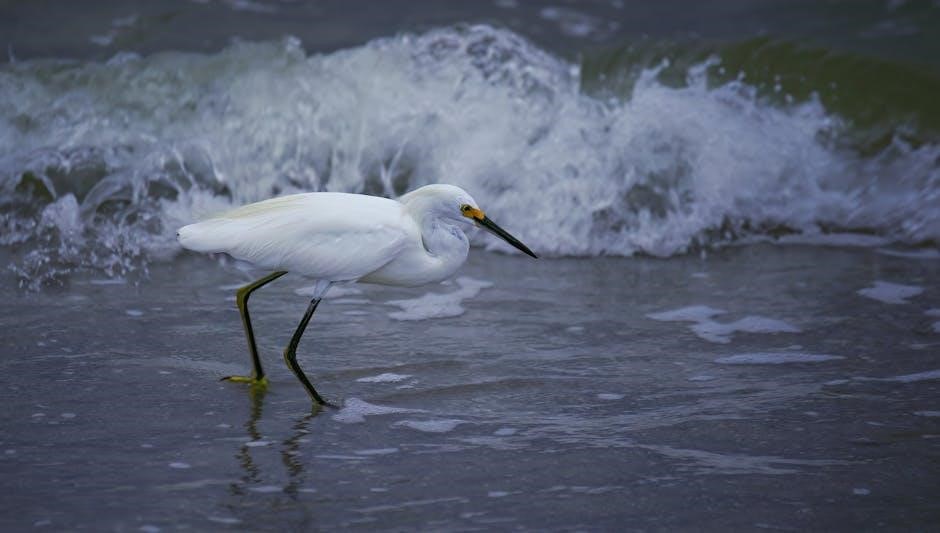
Weather and Tides: Critical Factors
Weather and tides significantly impact sea duck hunting, influencing bird movements and hunting conditions․ Guides rely on their expertise to navigate these challenges, ensuring safe and successful outings․
Understanding Tide Movements
Tide movements play a crucial role in sea duck hunting, as they dictate water levels, currents, and the availability of habitats for ducks․ High tides often bring ducks closer to shore, while low tides expose feeding areas like mudflats and reefs․ Guides meticulously study tidal patterns to predict duck movements, ensuring hunters are positioned in optimal locations․ Timing hunts during tidal changes can increase success, as ducks become more active during these periods․ Additionally, understanding how tides interact with wind and weather helps guides navigate safely and effectively․ Mastery of tidal dynamics is essential for a productive and safe sea duck hunting experience, making local knowledge invaluable in these challenging marine environments․
Adapting to Weather Conditions
Weather conditions significantly impact sea duck hunting, requiring guides to be highly adaptable․ Strong winds, heavy rain, and fog can hinder visibility and make navigation dangerous․ Guides must assess conditions to ensure safety, sometimes postponing hunts if weather becomes too severe․ Cold temperatures demand proper gear, such as layered clothing and waterproof apparel, to keep hunters comfortable․ Additionally, changing weather patterns can alter duck behavior, with certain species becoming more active during specific conditions․ Experienced guides use their knowledge to adjust strategies, ensuring a successful hunt while prioritizing safety․ Flexibility and preparedness are key to navigating the unpredictable marine environment effectively during sea duck hunting excursions․
Sea duck hunting is a challenging yet rewarding experience that requires skill, knowledge, and a deep respect for nature; Guides play a crucial role in ensuring safe and successful hunts, offering expertise in navigating harsh marine environments and understanding duck behavior․ By adhering to regulations, preparing with the right gear, and adapting to weather conditions, hunters can maximize their chances of success․ Ethical practices and conservation efforts are essential to preserving this tradition for future generations․ Whether you’re a seasoned hunter or a beginner, the guidance of an experienced professional can elevate your experience, helping you appreciate the beauty and complexity of sea duck hunting while ensuring a sustainable and enjoyable pursuit․